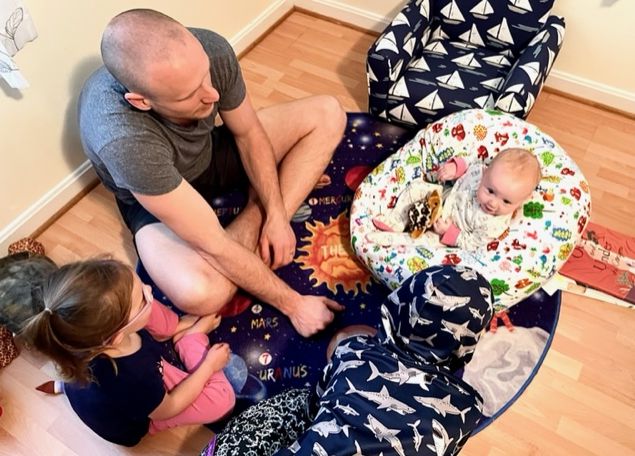Top 5 Parenting Tips (that I need to practice more)
It can be tough in a moment of stress to find a way through and not spin out emotionally. Here are the top five tips I have for getting through those difficult times and coming out on the other end building (instead of damaging) relationships with my children.

tip #1: pick your battles
This is one of my mother-in-law’s top tips. Mother of 8 and grandmother of 17, she’s a seasoned veteran of finding ways to build relationship in moments of stress.
My first parenting rule is Ignore What You Can, or ignore the behavior you don’t like and calmly encourage the behavior that you do like. By ignoring what you can or picking your battles, you are determining what is really worth investing the time and energy into challenging.
This protects both you and the child from a constant battle of wills where every slightest transgression is being pointed out and forcibly corrected. Children need space and time to be children: to mess up and to make messes. As long as the clean-up is calm and gentle consequences are enforced, the child is still learning and growing within healthy boundaries.
My 4-year-old loves to read books, and we have shelves upon shelves of children’s books for her to read. I typically give her the space and time to explore as many books as she wants, even if she’s making a huge mess. When she is done, I’ll take the five minutes it needs to sing the “Clean Up” song with her and model how to put the books back on the shelves.
Sometimes, a simple “no, thank you,” or a gentle “hush,” is enough to discourage undesirable behavior. Engaging in a long, drawn-out conversation about why you will not allow certain behavior can cause more harm than good. Choosing to only engage over issues that truly require correction (i.e. safety, hygiene, being gentle with younger siblings) allows the child to determine a hierarchy of what is important.

tip #2: try and try again
This is such an effective and easy tip, especially with older kids who know the rules and have simply acted out of impulse or without thinking first.
Our son tends to run in the house, about 5-7 times per day. He knows he’s not allowed to run in the house, so when he comes speeding up, we typically reply, “Why don’t you try that again?” More often than not, he happily returns to where he was, then calmly walks up to us. He likes the attention and the pleasure of our positive response to the correct behavior, so the motivation is high.
Toddlers can be more resentful of this, so making a game out of it is sometimes best. Our daughter is highly motivated by sound, so we tend to attach a funny noise or silly word to the desired behavior to get her to comply (i.e. “boop-boop, swoop!” to encourage her to wipe her mouth with a napkin during meals).
No one, adult or child, succeeds at a new skill the first time they attempt it. Everyone benefits from practice and from the opportunity to correct a mistake or demonstrate improvement.
This tip turns moments of boundary-transgression or rule-breaking into a moment of education and relationship-building. Both parent and child walk away from the conflict feeling positive.

tip #3: tell a story
Our son is a picky eater. One night, upon being asked to lick up the remainder of the expensive and beautiful olive oil on his plate, he began to resentfully complain how disgusting the olive oil was. I told him to pick up his plate, begin licking, and I would tell him a story about olive oil.
While bouncing my newborn gently to keep her from fussing, I recounted how the population in Sardinia, Italy, are known to consume olive oil with every meal and how they are one of the blue zones, or locations in the world where people regularly live past 100 years of age. I told him how, if he eats olive oil frequently, he is increasing his chances of having a long and healthy life.
The storytelling was surprisingly effective. By the end of my story, he was licking up every drop of olive oil and telling us how he wanted to live past 100. It turned a moment of potential force and anger into a moment of relationship-building.
Later that week, he asked me for another story and then began listing types of foods he wanted to hear stories about.
Children desire engagement and positive attention from their parents, pretty much above all other things. The younger they are, the more true this is. When a child is struggling with a concept or a boundary, telling a story serves to distract them from the conflict and deconstruct the desire of the parent into something more comprehensible.
We all watch or listen to stories to help us process our lives. Storytelling is one of the most ancient characteristics of culture; it’s one of the first things that began to differentiate us from animals. Telling a story taps into that basic humanity to help both adult and child cope with situations as they arise and connect over a shared journey.

tip #4: bedtime is sacred
I call the hour before dinner is served the “red hour” because everyone is tired and hungry, mom and dad are running around trying to make food happen, and the kids are under-supervised. It’s the time of day when so many things can spin out of control so easily.
Everyone tends to be at their worst in the evening, so evenings can elicit poor behavior from both parents and children. We found that evenings could be particularly bad in terms of meltdowns, acting out, and losing tempers. To cope with this, we tied some very clear structure to dinner time and bedtime.
Each night, we sit down to dinner as a family at our dining room table. The kids are not allowed to talk while eating; they are asked to focus on their food until they are finished. We have some conversation with them when they are done, then it is time to clean up dinner and have potty time, bath time, brushing teeth, and pajamas.
The kids have a combined bedtime routine with a bedtime story followed by bedtime prayers. Then they say goodnight to each other, and we give them each an individual goodnight. We go over the events of the day, say more individual prayers, and give hugs and kisses.
It is now a routine that they know by heart, but we began it because there were too many nights of frustrated, exhausted conversation about disciplinary issues with our son or absurdly irrational meltdowns from our daughter.
When we realized that evenings were the time when everyone was feeling emotionally and physically spent, we created a routine and ritual that induced feelings of security, belonging, peace, calm, and relaxation for everyone.
Poor sleep is the #1 thing that can turn adult or child from perfectly behaved into an absolute mess. It’s therefore a critical matter to promote sleep that makes everyone feel at peace with themselves and their loved ones.
I believe bedtime should be sacred for everyone, but it seems to be particularly important to maintain consistent and peaceful bedtime routines for children. Bedtime is the worst time of day to criticize or correct a child’s behavior. It’s the time when we should be firmly grounding the relationship in love and fostering feelings of security, safety, and belonging in the child.
But oxytocin (the bonding hormone) works both ways. Hugging and kissing your child–even if that child has been driving you crazy all day–can help both of you find a way through to prioritizing the relationship above the behavior. The child will go to sleep with feelings of belonging and security, and the parent is far more likely to go to sleep with feelings of hope and peace than with guilt or shame.
When bedtime is kept sacred, everyone is likely to get better sleep. When everyone sleeps better, everyone behaves better. The better quality sleep everyone gets, the less likely everyone is to get sick. The better sleep everyone gets, the easier and happier everyone’s days become.

tip #5: space and grace
On a particularly rough day with our son, my mother-in-law sent me a text, saying, “You have a new stepson, a child with a disability, and a newborn. Give yourself some grace.”
Grace is often the last thing I feel I deserve and thus the last thing I want to give myself. Despite this, I am capable of acknowledging that an objective appraisal of my situation would invariably grant me more grace than I ever give myself.
Grace and space go together. Sometimes, I need to take a moment and step outside to breathe the fresh air and get a little perspective. Taking the space I need when I need it protects both myself and my children from being sucked into an emotional whirlpool.
I am also terrible at self-care, but I am realizing more and more that self-care, coupled with space, makes me into a better mother. Space is necessary for adequate self-care, and together, space and self-care create an environment for grace to enter in.
Grace is beautiful, and like most beautiful things, it is elusive. It is difficult to define or measure, but you know it when you feel it. It’s different than laziness or procrastination. It’s that sigh of relief when you have tried your hardest, when you’ve done your best with the resources you have, and you can step back and acknowledge that fact. It’s sitting down and putting up your feet after running around all day. It’s going to sleep with peace in your heart.
Grace requires a level of surrender, and I have struggled with surrender for all of my life. I usually need to have a guilt, shame, or despair spiral prior to granting myself any grace, and I’m gradually realizing exactly how toxic this is.
To learn how to surrender to grace, I try to watch my children. They give themselves over to whatever they are feeling as they are feeling it, but they are a lot better at giving themselves over to joy and peace than I am.
I am learning slowly to take the space it requires to just watch them without intervening and to witness how happy they seem to be with their lives. Then I take a breath, close my eyes, and make space inside myself for grace to enter in.

following my own advice
We’re all works in progress, no matter how old we become. I try to practice what I preach, but, most of the time, I fall short. So I pick my battles and try to change one thing I don’t like about myself at a time. And if I fail, I try and try again. To distract myself from the struggle, I listen to a story. And at the end of a long day, I treat bedtime as sacred–as sanctuary–as space to surrender to the grace that I know is ready to enter in. . . just as soon as I have the strength to let it.







